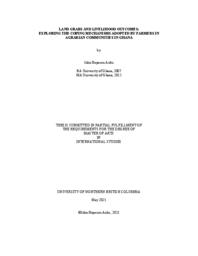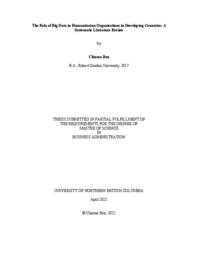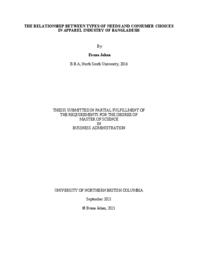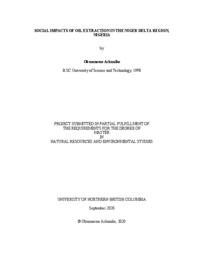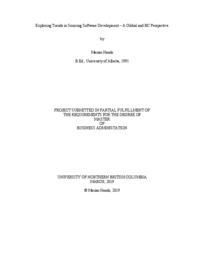Andrews, Nathan
Person Preferred Name
Nathan Andrews
Related Works
Content type
Digital Document
Description / Synopsis
Large-scale land acquisitions worldwide evoke controversy due to its impact on communities. This thesis employs the Sustainable Livelihoods Framework to examine the coping mechanisms adopted in host communities to cope with the impact of land grabs on livelihoods. The study adopts an exploratory approach using mixed-methods design to arrive at the findings. The thesis finds the effect of land grabbing on communities to be negative. This thesis also finds that the alternative livelihood activities people have resorted to in response are not sustainable. Further, it finds that the regulatory and institutional regime guiding these land transactions has done little to assist the people to cope well with the adverse outcomes of land grabs. These findings point to the need for the establishment of precise timelines for compensation to affected people. Also, there is the need to involve the people in the decision-making process from project planning to implementation.
Origin Information
Content type
Digital Document
Description / Synopsis
Being financially and technologically worse off than their counterparts in developed nations, many developing countries face natural disasters that cut them off from the rest of the world and cause excessive damage to invaluable human life and property. Sudden disasters require timely and accurate response from stakeholders to provide immediate relief while deploying scarce resources effectively. However, due to the large number of humanitarian aid agencies from different developed countries and a lack of knowledge, there is duplication of relief in many areas while countless more are left unattended. In this thesis, Resource Dependence Theory and Stakeholder Theory were employed to analyse how humanitarian organisations deliver services during a disaster. Systematic literature review was utilised for collecting data and the data was analysed using thematic analysis. During the data collection process, 300 papers were initially identified however, after further reassessment, 33 papers were left to be further analyzed. From this the researcher was able to identify that the use of Big Data in developing countries is proving to be extremely beneficial to humanitarian efforts, according to this thesis. It also explains how humanitarian organizations can make better use of big data by overcoming obstacles. The thesis suggests that increasing the number of data scientists and specialists by conducting big data training for staff, improving data governance (regulations, controls, and transparency), and enhancing privacy and security will result in major improvements in humanitarian operations. Give the importance of private stakeholders, companies' roles extend far beyond delivering profits to their shareholders, they must also address social issues by participating in disaster and humanitarian operations in developing countries.
Origin Information
Content type
Digital Document
Description / Synopsis
Consumer behavior signifies the way of people’s purchasing and consuming products and services. It is a hotbed of research which is intensely associated with human psychology and is essential for companies that are trying to sell their products or services to as many consumers as possible. Since various facets of consumers’ lives affect what they purchase and why they purchase, research on consumer behavior resolves the issues of understanding – how individuals respond to advertising and marketing, individuality – if the process can determine consumers’ personalities, social status, decision-making process. Consumer behavior research is important to determine how best to sell products or services by influencing consumers’ fears, their least healthy habits or their worst tendencies. This study has examined the relationship between consumer needs and consumer purchase behavior in terms of consumer choices of Bangladeshi customers for apparel market. Types of consumers’ choices and types of consumers’ needs are associated with each other. Types of needs are the underlying determinant of types of choices to satisfy consumers’ apparel necessity and these three categories of needs, that are recognised to satisfy apparel necessity (i.e. functional needs, social needs and experiential needs), are fulfilled by consumers through three recognised categories of choices (i.e. choice freedom, choice difficulty and choice confidence). Different categories of consumers have different types of needs and they behave differently while purchasing clothes, therefore, this study has figured out how consumers of Bangladesh make their choices according to their needs in apparel purchases. This study also examined how income levels work as a moderator while consumers make decisions. The purpose of this thesis is to shed light on the relationship of the consumers’ needs and choices. The key objective is to investigate how the correlation between consumers’ needs and choices influences the insights of consumers and their decision-making process. This study also inspected the affiliation between the needs and choices for the population with respect to certain key questions. Consequently, it identified a better understanding of the links between needs and choices and set a special consideration of how choices interact with various situations which is very important to sell the apparel products in best way. The study employed a survey research design which is quantitative in nature. Quantitative survey quantifies the problems by generating numerical data which can be converted into functional statistics and it is mostly used to measure attitudes, opinions, behaviors and any other defined variables (DeFranzo, 2011). The data was collected through a structured Likert-scale questionnaire which fulfilled the quantitative research nature. The included questions were related to the types of needs and choices theories, with focus on consumers’ purchase behavior. Therefore, it was able to investigate quantitatively due to the nature of the research. Respondents completed the questionnaire which was administrated via online electronic form through SurveyMonkey. After collecting the data, it ran ordinal regression models on the basis of dependent and independent variables of the questionnaire and that provided a clear indication of consumers’ actual preference structure. This research paper was demonstrated with the broad overview about the consumers’ choices according to the types of their needs. The study found that types of needs are positively associated with types of choices and low-income level and high-income level have decreased and increased impact accordingly with the positive relationships of needs and choices. The findings of the paper offer some valuable considerations for related theories, especially on topic of consumers’ purchase behavior by highlighting the contextual differences between needs and choices and by highlighting the other influencing factors associated with these. It contributes to build up new concepts of consumer purchase behavior theory in terms of branding theory and consumers’ needs and selection process also demonstrates that how types of needs influence consumers’ purchase decision through types of choices. Moreover, new concepts or strategies and psychological explanations of consumers help the managers to sell their products appropriately.
Origin Information
Content type
Digital Document
Description / Synopsis
Oil was discovered in Nigeria in1956 at Oloibiri in the Niger Delta Region after almost 50 years of exploration. Shell-BP at that time, was the sole concessionaire because non-British companies were not given exploration license to operate in Nigeria. After Nigerian Independence in 1960, exploration rights were extended to other multinational oil companies. More than 16 multinational oil companies were in operation with little or no supervision from the Nigerian Government, which created significant environmental, political,and social impact in the region. A critical discourse analysis of documents from Shell, Amnesty International, THISDAY Newspaper revealed that the Nigerian government has failed to safeguard the environment and the lives of the people. On the basis of evidence presented on this research, in addition to literature, it can be argued that oil has turned out to be a curse to the Niger Delta Region and Nigeria in general.
Origin Information
Content type
Digital Document
Description / Synopsis
Ghana joined the league of oil and gas producing countries in 2007 when oil was discovered in the Gulf of Guinea. Through the years, however, concerns have emerged over the impacts of oil and gas activities on coastal livelihoods, especially since the benefits of extraction do not seem to trickle down to these communities. This thesis employs the Feminist Political Economy framework to examine the gendered disparities embedded in relations between offshore oil extraction and livelihoods of women in Ghana. Through an exploratory approach and a mixed methods design, I reveal how the intersection of culture, geography, politics, race and class foster the dispossession of coastal women. Among other findings, this thesis reveals that fishing is still the main source of livelihoods, and a culturally import source of food for the Western Region. It also shows that the advent of oil in the region has not improved but worsened women's livelihoods.
Origin Information
Content type
Digital Document
Description / Synopsis
Widespread displacement of persons domiciled in northeastern Nigeria is one of the most profound aftermaths of the Boko Haram insurgency. This study investigates the challenges of internally displaced persons (IDPs), particularly women and girls, in northeastern Nigeria. The focus is primarily on the United Nations’ (UN) interventions and reintegration policies as the “government of the world,” the implementation of these policies in the Nigerian context, and their effectiveness for women and girls. The study asks the following questions: What are the general and gender-specific challenges of IDPs in northeastern Nigeria? How have the UN intervention and reintegration processes responded to those challenges? How gender-sensitive are the UN’s intervention and reintegration processes for Nigeria’s female IDPs in that part of the country? The researcher applied internationalism and a feminist perspective on human security as the conceptual framework for this study.
Origin Information
Content type
Digital Document
Origin Information

